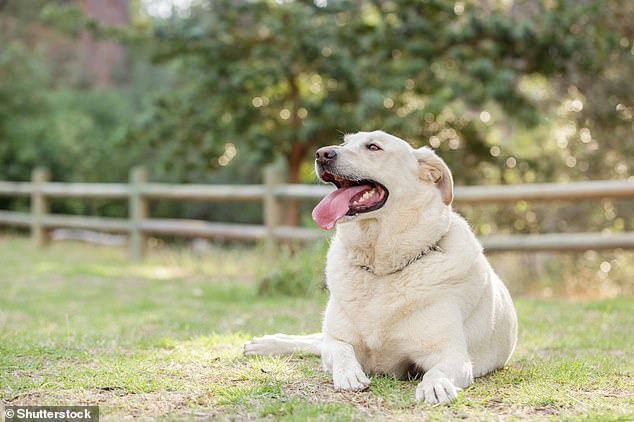Labradors are one of the most popular dog breeds, but they have an insatiable desire for food.
Now scientists have shown that many Labradors cannot stop eating due to a genetic mutation that “connects” them to obesity.
About 25 percent of Labradors face a “double whammy” of feeling hungry all the time and burning fewer calories because of this genetic quirk, research suggests.
Fortunately, there are several things you can do to reduce your pet’s risk of obesity and ensure they live a long, healthy life.
Veterinarians have revealed seven simple tips: among them, distract them with toys and walks, avoid giving them leftovers and take them for walks at least one or two a day.

Tips for keeping your Labrador thin include distracting him with toys and walks, avoiding giving him leftovers, and taking him for a walk at least once or twice a day.
“People are often rude to owners of fat dogs, blaming them for not properly managing their dogs’ diet and exercise,” said Dr. Eleanor Raffan from the Department of Physiology, Development and Neuroscience at the University of Cambridge.
«But we have shown that Labradors with this genetic mutation search for food all the time, trying to increase their energy intake.
“It’s very difficult to keep these dogs thin, but it can be done.”
One of the best tips is to give your dog attention in the form of play instead of food.
It’s often easier to trick an attention-seeking dog with a tasty treat, but a better way is to reward him with a game, such as a toy or an activity that provides exercise.
Dogs can be given treats, but they must be healthy and should only be given as a reward during training or exercise.
One or two walks a day is also key for your dog to burn calories and maintain a healthy weight in case he is a carrier of the genetic mutation.
The mutation is found in a gene called POMC, which plays a critical role in hunger and energy use.
It activates a hunger signal that tells the body to increase food intake and conserve energy, even though this is unnecessary.
The researchers found that 25 percent of Labradors and 66 percent of flat-coated retrievers have the POMC mutation, which manifests itself in two ways: They feel hungry all the time and burn fewer calories compared to Labradors without the mutation.


Labradors are known for eating a lot and fast, making them prone to obesity, but a study shows exactly why that is.
“Affected dogs tend to overeat because they get hungry between meals more quickly than dogs without the mutation,” said Dr. Raffan, lead author of the new study published in Science Advances.
‘All owners of Labradors and flat-coated retrievers should be careful about what they feed these highly food-motivated dogs, to maintain a healthy weight.
“But dogs with this genetic mutation face a double whammy; Not only do they want to eat more, but they also need fewer calories because they don’t burn them as quickly.’
For the study, 87 adult Labrador retrievers, all of healthy weight or moderately overweight, participated in several tests, including the “sausage in a box” test.
They were fed a standard breakfast of dog food before being offered a sausage in a clear plastic box three hours later.
The box was made of clear plastic with a perforated lid, so the dogs could see and smell the sausage but couldn’t eat it.
The researchers found that dogs with the POMC mutation tried much harder to get the sausage out of the box than dogs without it, indicating greater hunger.
Other dogs without the mutation lost interest in the sausage earlier because they knew they wouldn’t be able to access it.
The dogs were then allowed to sleep in a special chamber that measured the gases they exhaled.
This revealed that dogs with the POMC mutation burned about 25 percent fewer calories than dogs without it.
Interestingly, some humans also have mutations in the POMC gene and tend to become obese at a young age and, as a result, develop a number of clinical problems.


About 66 percent of flat-coated retrievers (pictured) have the POMC mutation. Dogs with the mutation tend to overeat because they get hungry between meals more quickly than dogs without it.
Veterinarians warn that canine obesity is linked to serious health problems, including arthritis, diabetes, heart disease, incontinence, respiratory problems and certain types of cancer.
A 2021 study by the Royal Veterinary College (RVC) found that one in 14 dogs in the UK, or 7.1 percent, are obese.
From a sample of more than 20,000 dogs, pugs, beagles and golden retrievers were the breeds with the highest risk of obesity compared to crossbreeds, the study found.
In addition to the difference between breeds, being neutered and being middle-aged were other factors associated with higher chances of being overweight.
Changes in sex hormones after neutering are thought to result in behavioral changes, specifically increased appetite and decreased physical activity, leading to a tendency to gain weight.
